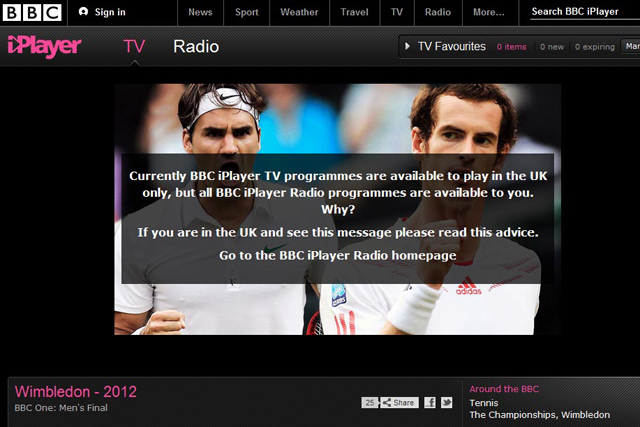
I've been travelling outside the UK quite a lot recently, and one thing that has become a consistent headache is trying to watch UK television on the road. The Beeb won't let me access the iPlayer, and Sky Go went as soon as I left the country.
While these two media behemoths are busy protecting their content and wrestling with usage and syndication rights, there is little consumers can do.
Just over a week ago, Boris Becker, John Lloyd and Tim Henman took to the airwaves to cover Andy Murray's attempt at Wimbledon history. If you couldn't take the Tube to Southfields, watching the BBC was the next best way to enjoy a truly British experience.
Proxy servers
From Vienna, however, this wasn't possible without playing with proxy servers and trying to cheat the system.
I would have gladly paid a fiver to have watched the game if the BBC had allowed me. Like many broadcasters, however, its world is closed.
Last week, The New York Times and The Wall Street Journal cut deals that will allow their paid content to be accessed on other platforms all over the world.
Subscribers can now access all of The New York Times content on Flipboard's popular mobile app as part of its 'NYT Everywhere' strategy. Similarly, The Wall Street Journal is selling premium content on the Pulse news aggregation app.
Commercial innovation
In other words, these two newspapers have extended their paywalls on to other platforms and are outpacing the commercial innovation of the BBC and Sky, two supposedly very 'modern' media companies.
Consumer preference has often outpaced company decisions when it comes to how content flows across the internet. One need look no further than the music sector for an example of how the pirates (Kazaa, Limewire and Napster) and new competitors (Apple's iTunes, Spotify and Pandora) crushed what was once a thriving and closed system. This hard lesson for the music industry should serve as a notice to other closed businesses and industries.
Here are a few questions to ponder until next time. Do you think people see your business as closed or open? Do you spend more time protecting your products or finding new ways to share them? Do you spend more time talking to lawyers than your customers? Do you think that letting people remix whatever you make is a bad idea?
If history is any predictor of the future, fortune will favour the open.
George Nimeh, aka @iboy, is a digital consultant.
IN ACTION
Are the 'three As' closed or open systems?
AOL
One of the first content mega-portals, America Online (now AOL) created a universe of content, commerce and services inside a protective and secure bubble, leaving the 'rest of the internet' at arm's-length from most users. It failed miserably.
Apple
Nowhere is the commercial upside of a high-quality closed ecosystem more clear than when looking at Apple. It creates industry-leading hardware, supported by 400m active iTunes accounts, each with a valid credit card number. So far, so good.
Android
Google's Android operating system is based on an open source platform, and while it may lack the community-based development and a behind-the-scenes view, it is considered an open system. Size matters - and Android is huge.

